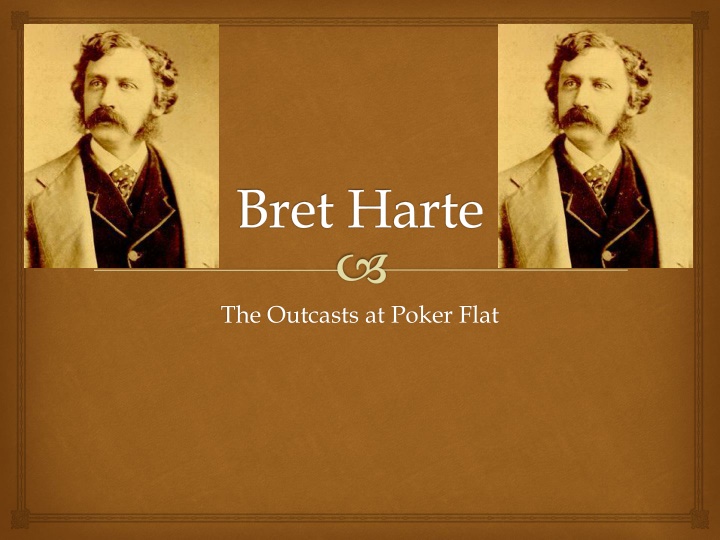
Exploring Bret Harte's Realism and American Literary Movements
Discover the literary works of Bret Harte within the context of American Realism and Local Color movements. Understand the principles of Realism, characteristics of realistic writing, and the significance of Harte's contributions to literature. Dive into the themes and styles that defined Harte's storytelling, set against the backdrop of regionalism and morality in American literature.
Download Presentation

Please find below an Image/Link to download the presentation.
The content on the website is provided AS IS for your information and personal use only. It may not be sold, licensed, or shared on other websites without obtaining consent from the author. If you encounter any issues during the download, it is possible that the publisher has removed the file from their server.
You are allowed to download the files provided on this website for personal or commercial use, subject to the condition that they are used lawfully. All files are the property of their respective owners.
The content on the website is provided AS IS for your information and personal use only. It may not be sold, licensed, or shared on other websites without obtaining consent from the author.
E N D
Presentation Transcript
Bret Harte The Outcasts at Poker Flat
Bret Harte In 1868 named editor of Overland Monthly. Wrote Outcasts at Poker Flat and Luck of Roaring Camp and became famous in 1871 signed with The Atlantic Monthly for $10,000 for 12 stories a year, the highest figure offered an American writer up to that time. He found in England a ready audience for his tales of a past or mythical California long after American readers tired of his formula
Mark Twains Opinion I detest him, because I think his work is 'shoddy.' His forte is pathos but there should be no pathos which does not come out of a man's heart. He has no heart, except his name, and I consider he has produced nothing that is genuine. He is artificial. - interview in Sydney Australia Argus, 9/17/1895
Harte, Realism and Local Color
Harte, Realism and Local Color Like Twain, Harte s writing centered on western U.S. and employed local color Local color or regional literature is fiction and poetry that focuses on the characters, dialect, customs, topography, and other features particular to a specific region. Local color attempts to portray accurate dialect patterns, mannerisms, thoughts, and topography of a specific region. Often uses eccentrics as characters, possesses whimsical humor Local color began in 1880 s with short stories as its principal medium. It gained popularity after the Civil War.
Principles of Realism Insistence upon and defense of the commonplace Character more important than plot Emphasis on morality often self-realized and upon examination of idealism
Identifying Characteristics of Realistic Writing The morality is intrinsic and relative. Relationships between people and society are explored. The style is the vehicle which carries philosophy, subject matter and morality. De-emphasizes authorial comment Objection towards the omniscient point of view
Allusions There was a Sabbath lull in the air, which in a settlement unused to Sabbath influences, looked ominous. In point of fact, Poker Flat was after somebody. He was too much of a gambler not to accept fate. We ve had a streak of bad luck since we left Poker Flat Trojan bully and wily Greek wrestled in the winds, and the great pines in the canon, seemed to bow to the wrath of the son of Peleus.
Theme and Naturalism Naturalism suggests that social conditions, heredity, and environment are inescapable forces that shape human character. In other words, Nature (the being that surrounds humanity in all facets) controls humans and is indifferent to their plight They are all people of lower class One of them steals from the others The weather conspires against them
Archetype An archetype is an imaginative pattern repeated through the ages. Harte is credited with inventing the Western archetypal hero self-reliant, solitary, and fearless. The original Westerners were only human, yet why do most people prefer legend over reality?





